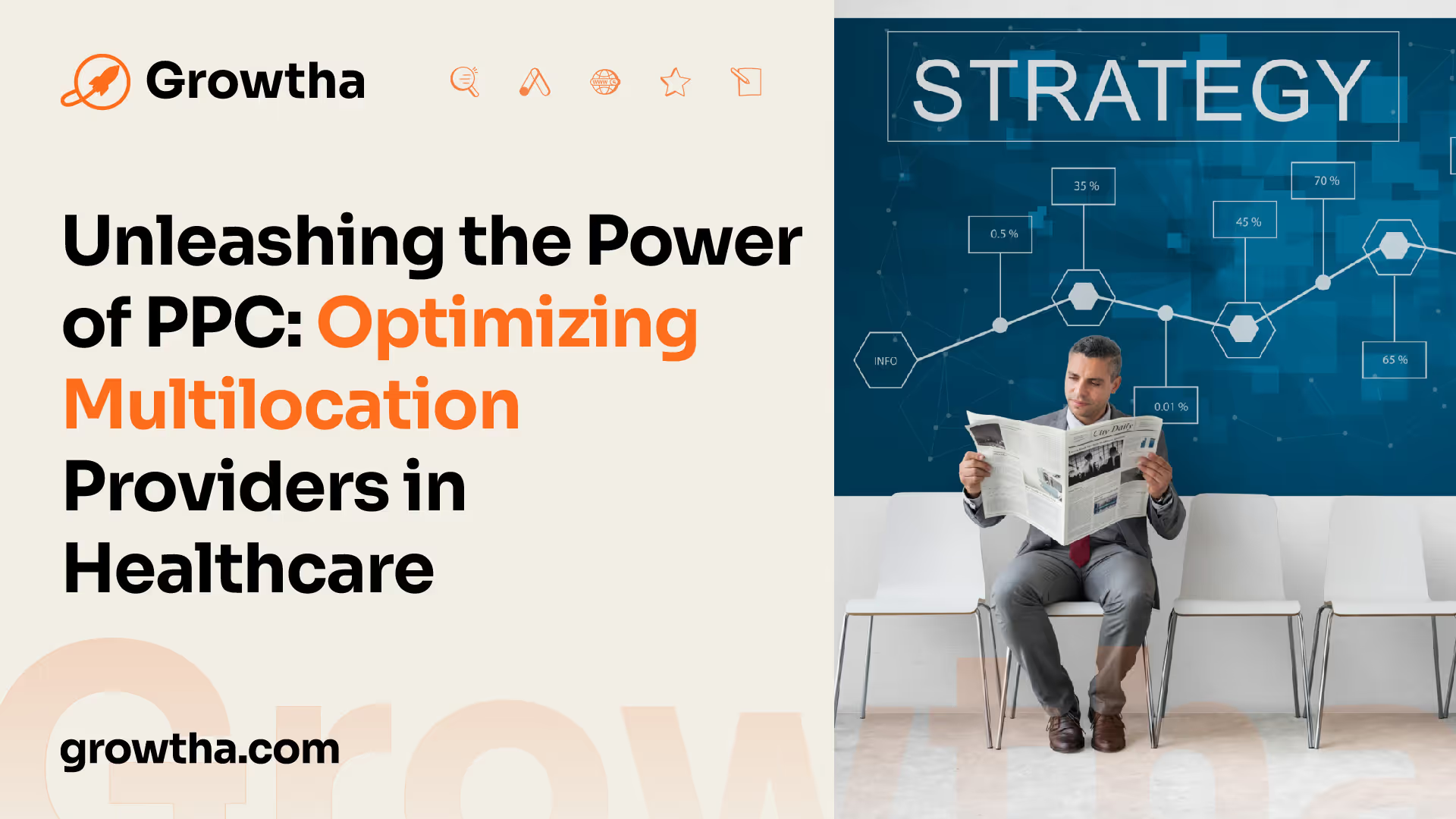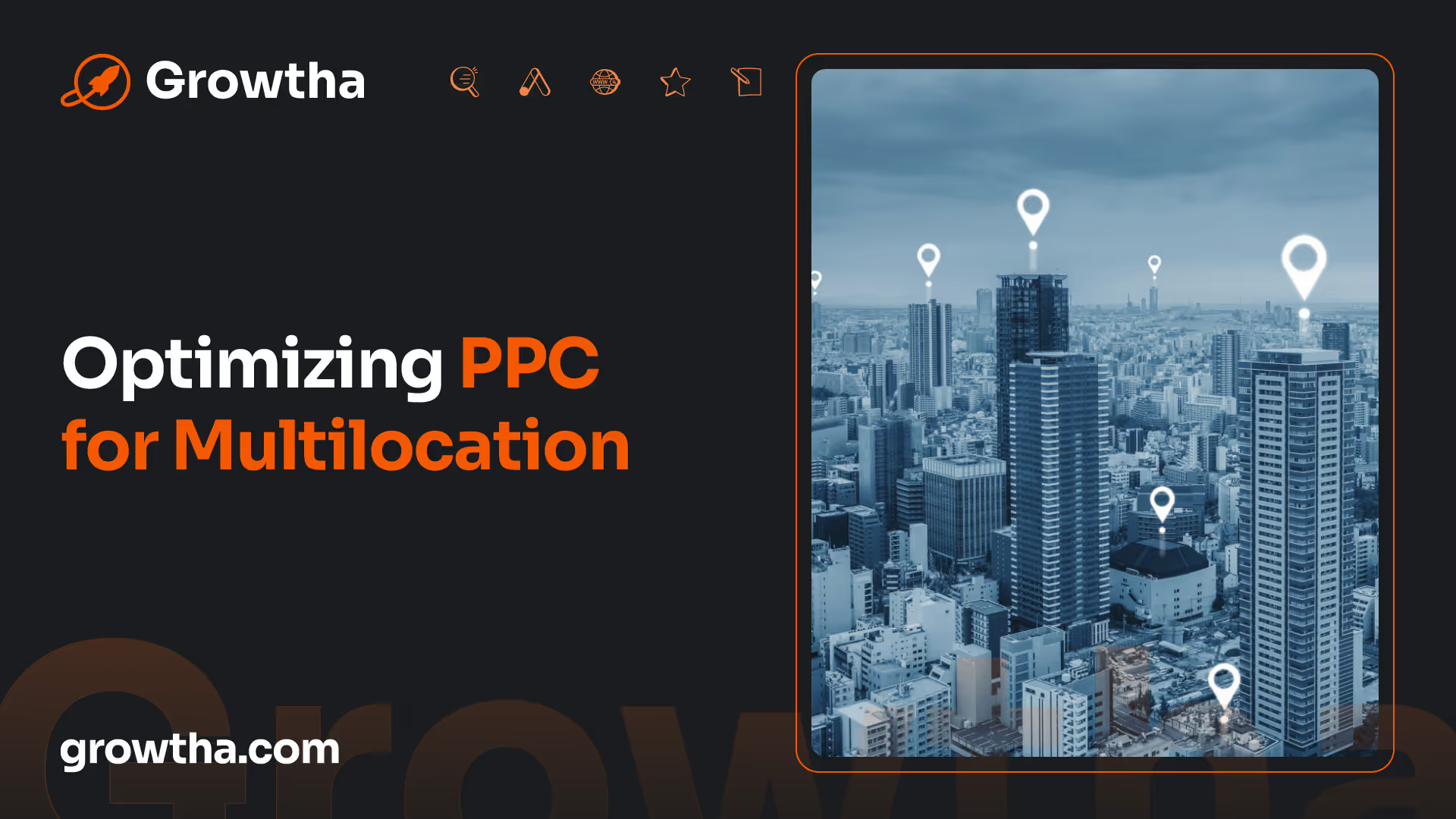Unleashing the Power of PPC: Optimizing Multilocation Providers in Healthcare
It's crucial to have a solid understanding of the basics of PPC advertising and recognize the importance of this marketing strategy for healthcare providers.


Unleashing the Power of PPC: Optimizing Multilocation Providers in Healthcare
Understanding PPC for Healthcare
To effectively optimize PPC (Pay-Per-Click) advertising for multilocation providers in the healthcare industry, it's crucial to have a solid understanding of the basics of PPC advertising and recognize the importance of this marketing strategy for healthcare providers.
Basics of PPC Advertising
PPC advertising is a digital marketing strategy that allows businesses and organizations to display ads on search engine results pages (SERPs) and other online platforms. With PPC, advertisers only pay when a user clicks on their ad, making it a cost-effective method for reaching a target audience.
In PPC advertising, keywords play a significant role. Advertisers bid on keywords relevant to their products, services, or industry. When a user searches for those keywords, the search engine displays the ads associated with them. Ad placement is typically based on a combination of bid amount and ad relevance.
The major search engines, like Google Ads, Bing Ads, and Yahoo Gemini, offer PPC advertising platforms that provide tools and features to manage campaigns, set budgets, and track performance.
Importance of PPC for Healthcare Providers
PPC advertising is particularly important for healthcare providers, especially those with multiple locations. Here are some reasons why healthcare providers should prioritize PPC:
- Increased visibility: PPC ads appear at the top of search engine results, increasing the visibility of healthcare providers to potential patients. This is especially beneficial for multilocation providers aiming to reach a wider audience across different locations.
- Targeted advertising: PPC allows for precise targeting based on keywords, location, demographics, and other parameters. By optimizing PPC campaigns, healthcare providers can reach their desired audience effectively.
- Enhanced brand awareness: PPC advertising helps healthcare providers establish their brand presence and promote their services to a larger audience. Consistent exposure through PPC campaigns can increase brand recognition and trust.
- Measurable results: PPC platforms provide comprehensive performance metrics, allowing healthcare providers to track the effectiveness of their campaigns. This data can be used to optimize strategies, improve ROI, and make informed decisions about budget allocation.
By understanding the basics of PPC advertising and recognizing its importance for healthcare providers, multilocation healthcare providers can unlock the power of PPC to reach their target audience, increase brand visibility, and achieve their marketing goals.

Optimizing PPC for Multilocation
When it comes to healthcare providers with multiple locations, optimizing pay-per-click (PPC) advertising strategies is crucial for effective marketing and reaching a wider audience. This section will explore the unique challenges faced by multilocation providers in healthcare, as well as strategies for optimizing their PPC campaigns.
Multilocation Providers in Healthcare
Multilocation providers in the healthcare industry refer to organizations that have multiple clinics, hospitals, or healthcare facilities spread across different geographical locations. These providers aim to serve a diverse patient base and expand their reach to attract new patients.
Challenges of Multilocation PPC
Managing PPC campaigns for multilocation providers in healthcare comes with its own set of challenges. Some common challenges include:
- Geographical targeting: Healthcare providers need to ensure that their PPC campaigns are appropriately targeted to each location. This involves creating location-specific ads and landing pages to cater to the unique needs and preferences of patients in each area.
- Budget allocation: Allocating budgets for multiple locations can be complex. It is essential to carefully analyze data and determine the optimal budget distribution to maximize return on investment (ROI) for each location.
- Consistency and brand messaging: Maintaining consistent brand messaging across all locations can be challenging, especially when creating and managing multiple PPC campaigns simultaneously. It's important to ensure that the brand identity is unified while addressing the specific needs of each location.
Strategies for Multilocation PPC Optimization
To optimize PPC campaigns for multilocation providers in healthcare, consider implementing the following strategies:
- Location-specific keyword targeting: Use location-specific keywords in your PPC campaigns to improve relevancy and reach the target audience in each location. This helps to increase the chances of your ads being shown to potential patients in the right geographical area.
- Geotargeting: Leverage geotargeting settings in your PPC campaigns to ensure that your ads are displayed to users within a specific radius of each location. This helps to reach individuals who are more likely to convert into patients.
- Ad extensions: Utilize ad extensions such as location extensions to provide additional information about each location, such as addresses, phone numbers, and business hours. This not only improves the visibility of your ads but also enhances the user experience by providing convenient access to location-specific details.
- Conversion tracking: Implement conversion tracking to measure the effectiveness of your PPC campaigns for each location. This allows you to identify which locations are generating the highest number of conversions and adjust your strategies accordingly.
By implementing these strategies, multilocation healthcare providers can optimize their PPC campaigns to target specific locations, overcome challenges, and maximize their online visibility and patient acquisition efforts. It's important to regularly monitor and analyze the performance of each location's PPC campaigns to make data-driven optimizations and drive success across all locations.

Key Metrics for Success
When it comes to optimizing PPC (Pay-Per-Click) campaigns for multilocation healthcare providers, understanding key metrics is essential for measuring success and making data-driven decisions. By tracking and analyzing PPC performance, healthcare providers can gain valuable insights into the effectiveness of their campaigns and make necessary optimizations. Let's explore the key metrics for success in PPC campaigns.
PPC Metrics Overview
To evaluate the performance of your PPC campaigns, you need to monitor and analyze various metrics. Here are some essential metrics to consider:
- Impressions: The number of times your ads are shown to users.
- Clicks: The number of times users click on your ads to visit your website.
- Click-Through Rate (CTR): The percentage of users who click on your ads compared to the number of impressions. It is calculated by dividing the number of clicks by the number of impressions and multiplying by 100.
- Conversion Rate: The percentage of users who complete a desired action on your website, such as filling out a form or making a purchase.
- Cost Per Click (CPC): The average amount you pay for each click on your ads.
- Cost Per Conversion (CPC): The average amount you pay for each conversion.
- Return on Ad Spend (ROAS): The revenue generated from your PPC campaigns divided by the cost of those campaigns, expressed as a ratio or percentage.
- Quality Score: A metric used by search engines to evaluate the relevance and quality of your ads and landing pages. A higher quality score can lead to lower costs and better ad positions.
Tracking and Analyzing PPC Performance
To effectively optimize your multilocation PPC campaigns, it's crucial to track and analyze the performance of your ads. Here's a step-by-step process:
- Set up Conversion Tracking: Implement conversion tracking on your website to measure the actions users take after clicking on your ads. This will allow you to determine the success of your campaigns in terms of conversions and ROI.
- Use Analytics Tools: Utilize analytics tools like Google Analytics to gain insights into user behavior, traffic sources, and campaign performance. Track metrics such as bounce rate, time on site, and page views to understand user engagement and website performance.
- Segment Performance: Analyze the performance of your PPC campaigns at the individual location level. Compare metrics like CTR, conversion rate, and ROAS across different locations to identify high-performing areas and areas that may require optimization.
- A/B Testing: Conduct A/B tests to experiment with different ad copies, landing page designs, and calls-to-action. By testing variations, you can identify what resonates best with your target audience and optimize your campaigns accordingly.
- Regular Monitoring: Continuously monitor your PPC campaigns to identify trends, spot any issues, and make necessary adjustments. Regularly review your metrics and compare them to your goals to ensure your campaigns are on track.
By consistently tracking and analyzing PPC performance, healthcare providers can make data-driven optimizations to their multilocation campaigns. This allows for more effective targeting, improved ROI, and ultimately, better results in reaching and engaging with their target audience.
Ad Copy and Landing Pages
Creating compelling ad copy and designing effective landing pages are essential components of optimizing PPC campaigns for multilocation healthcare providers. These elements play a crucial role in attracting potential patients, driving conversions, and maximizing the return on investment (ROI) of your PPC efforts.
Crafting Effective Ad Copy
Crafting persuasive ad copy is key to capturing the attention of your target audience. When creating ad copy for multilocation healthcare providers, it's important to consider the specific services offered, the unique selling points of each location, and the needs and preferences of potential patients.
To create effective ad copy:
- Use concise and attention-grabbing headlines that highlight the key benefits or offerings of your healthcare services.
- Incorporate relevant keywords to ensure your ads appear in search results for relevant queries.
- Include a clear call-to-action (CTA) that encourages users to take the desired action, such as scheduling an appointment or contacting the nearest location.
- Highlight any special promotions, discounts, or unique features that differentiate your multilocation healthcare services.
Remember, ad copy should be tailored to the target audience and aligned with the specific goals of each PPC campaign. Regularly test and optimize your ad copy by analyzing click-through rates (CTR) and conversion rates to identify what resonates most with your audience.
Designing Landing Pages for Conversions
Once a user clicks on your ad, it's crucial to provide them with a seamless and engaging experience on the landing page. A well-designed landing page can significantly impact conversion rates and the overall success of your PPC campaign.
To design effective landing pages for multilocation providers in healthcare:
- Ensure that the landing page is relevant to the ad copy and the specific location mentioned in the ad.
- Maintain a clean and visually appealing layout, with easy-to-read content and clear navigation.
- Include compelling headlines and subheadings that highlight the benefits of your healthcare services.
- Incorporate persuasive elements such as testimonials, patient success stories, and trust signals to build credibility.
- Place a prominent and visible CTA button that directs users to take the desired action, such as filling out a contact form or scheduling an appointment.
- Optimize the landing page for mobile devices to accommodate users who may be accessing it from smartphones or tablets.
Regularly track and analyze the performance of your landing pages, paying attention to metrics such as bounce rate, time on page, and conversion rate. By identifying areas for improvement and conducting A/B testing, you can optimize your landing pages to maximize conversions and achieve your PPC goals.
Crafting compelling ad copy and designing effective landing pages are integral to the success of PPC campaigns for multilocation providers in the healthcare industry. By continuously refining these elements based on data-driven insights and user feedback, you can enhance the performance of your PPC campaigns and drive meaningful results.
Local SEO Integration
To effectively optimize PPC campaigns for multilocation healthcare providers, it is crucial to integrate local SEO strategies. Local SEO helps target specific geographical areas and ensures that the PPC ads reach the right audience. In this section, we will explore the importance of local SEO for multilocation providers and discuss how to align PPC with local SEO strategies.
Local SEO for Multilocation Providers
Local SEO plays a significant role in the success of multilocation healthcare providers. It helps them improve their visibility in local search results and attract patients in each specific location. By implementing local SEO practices, such as optimizing Google My Business profiles, creating location-specific landing pages, and building citations on local directories, healthcare providers can ensure that their PPC campaigns align with local search intent.
One essential aspect of local SEO for multilocation providers is consistent and accurate business information across all online platforms. This includes maintaining consistent NAP (name, address, phone number) data, ensuring that each location's information is up to date, and managing online reviews for each location. By optimizing local SEO, healthcare providers can enhance their online presence and increase the chances of appearing in relevant local search results.
Aligning PPC with Local SEO Strategies
To optimize PPC campaigns for multilocation providers, it is essential to align PPC efforts with local SEO strategies. Here are some key considerations:
- Geotargeting: Utilize geotargeting settings within PPC platforms to ensure that ads are shown to the right audience in specific locations. By targeting ads to the relevant geographic areas, healthcare providers can maximize the impact of their PPC campaigns.
- Keyword Optimization: Incorporate location-specific keywords into PPC ad copy and landing pages. This helps increase relevance and improves the chances of appearing in local search results. For example, including city or neighborhood names in ad headlines or descriptions can attract users searching for healthcare services in those areas.
- Ad Extensions: Take advantage of ad extensions, such as location extensions or call extensions, to provide additional information to potential patients. Location extensions display the addresses of individual locations, while call extensions allow users to directly call the healthcare provider. These extensions enhance the local relevance of PPC ads and facilitate engagement.
- Landing Page Optimization: Create location-specific landing pages that align with PPC campaigns. These pages should include relevant information about the specific location, such as address, contact details, services offered, and testimonials. Optimizing landing pages for local SEO can improve the user experience and increase conversion rates.
By integrating local SEO strategies into PPC campaigns, multilocation healthcare providers can enhance their visibility in local search results and effectively target their desired audience. This integration ensures that PPC ads align with local search intent and maximize the impact of marketing efforts.
Budgeting and ROI
When implementing a PPC (Pay-Per-Click) advertising strategy for multilocation healthcare providers, proper budget allocation and measuring the return on investment (ROI) are essential. This section will explore the key considerations for budget allocation and effective ROI measurement for multilocation providers in the healthcare industry.
Budget Allocation for PPC
Determining the appropriate budget for PPC campaigns is crucial to ensure optimal results. The budget allocation should take into account various factors such as the size and reach of the multilocation healthcare provider, competition, target audience, and the specific goals of the PPC campaign.
To effectively allocate the budget, it's important to conduct thorough research and analysis. This includes identifying the target keywords and their associated costs, understanding the average cost per click (CPC) for the healthcare industry, and evaluating the estimated number of clicks required to achieve the desired results.
A common approach is to allocate a larger portion of the budget to higher-value services or locations that generate a significant return on investment. However, it is also important to allocate a portion of the budget to test new strategies and optimize underperforming locations or services.
Measuring ROI for Multilocation Providers
Measuring the ROI of PPC campaigns is essential to evaluate the effectiveness of the advertising efforts and make data-driven decisions. ROI can be measured by comparing the revenue generated from the PPC campaigns to the total cost of the campaigns.
To accurately measure ROI for multilocation providers, it is important to track and attribute conversions accurately. This involves implementing proper tracking mechanisms, such as conversion tracking codes or call tracking, to identify the specific PPC campaigns or locations that generated the conversions.
In addition to revenue generated, other metrics such as click-through rates (CTR), cost per click (CPC), and conversion rates should be considered to gain a comprehensive understanding of the campaign's performance. These metrics can help identify areas for improvement and guide future budget allocation decisions.
It's important to regularly analyze the ROI data and make adjustments to the PPC campaigns based on the insights gained. This may involve reallocating budgets to high-performing campaigns or making strategic changes to underperforming campaigns.
By effectively allocating the budget and measuring the ROI of PPC campaigns, multilocation healthcare providers can optimize their advertising efforts, improve their marketing strategies, and achieve a higher return on investment for their PPC initiatives.
References
https://healthcaresuccess.com/blog/paid-search/ppc-for-multilocation-practices.html







